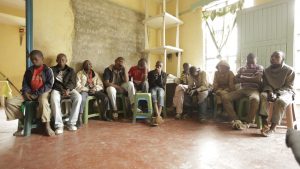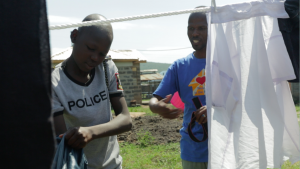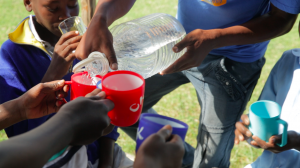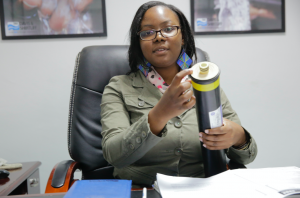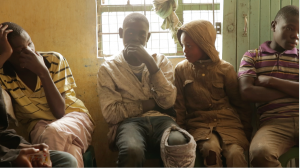Clean Water for All
We pull up to a muddy ally, and are greeted by Kevin, a shy boy who is proudly wearing one of his best outfits, his shoes a gleaming white against the brown mud. Despite him being quiet, he exudes a sweetness, an inner self assurance, something I especially notice a few minutes later when we are surrounded by the street boys. Kevin leads us into the gates of the WTF drop in center, a place where street boys from the neighboring slum come to hang out for a few hours a day. The center is specifically only open for a few hours each day, so that the boys don’t heavily depend on the the sparse services provided: counseling, prayer, and a cup of porridge. We see the boys slowly start to arrive. The contrast between their appearance, and that of Kevin, is stark. While Kevin is wearing clean clothing and looks healthy, many of the boys have glazed eyes, are in tattered and torn clothing, with mismatching shoes and some of them no shoes at all. They gather in a circle around Chris, who runs the center. He is a social worker on a 1-year contract.
The starting prayer begins, and all the boys close their eyes, the first time I see some sort of relief on their faces. While all of them are over 12 years old, in this moment, they look like the children they truly are: young, vulnerable, innocent. Their lives have been rough, the streets are unforgiving. Chris later tells me that many of them sniff glue, a quick and cheap way to get high, and forget their troubles. But here, in the moment of prayer, they are relaxed. They are safe from the streets, a moment in their day when they feel that someone cares about their wellbeing.
In a couple of hours, the center will close for the day. They do this because the ultimate goal is to encourage each boy to move into the Boys Ranch. Nestled in the outskirts of Nakuru, about 30 minutes from the drop in center, the Boys ranch is a haven for these street boys who are looking for a second chance. These boys often leave their homes and end up on the streets out of desperation – they come from a background of extreme poverty. There is usually not enough food on the table, or enough money to send them to school. Fueled by depression, their parents often turn to alcohol abuse, drug use, or prostitution, creating unstable, often violent environments. After living on the streets for some time, the boys are at risk of falling into gang activity, drug use, and trafficking. But in order to come to the Boys Ranch, they must take the initiative. They must want to change, they must realize their potential. The drop in center helps them do this, through the counseling offered, and also through visits by former street boys such as Kevin, who come to give first hand accounts of life on the ranch.
The Boys Ranch was created by WTF, or Welcome to the Family, a children’s organization run by a Catholic ministry. The organization is composed of three crucial centers: the drop in center for boys, which is the first point of contact, after which they decide, on their own will, to enter the rehabilitation ranch for boys. In addition, the organization has a girl’s rescue center for girls who have been sexually abused, where the girls receive psychological support, safe shelter, and even legal counseling, while their cases are taken to court. The importance of the center to the community is clearly visible when you take into account that the there are no other social services in place to address these issues. The protocol in fact is, when a child is seen living in the streets or when a case of abuse is brought to the attention of authorities, the child is placed in a private center such as Welcome to the Family’s. The center receives no economical support from the government, so they are left constantly asking for donations and relying on the goodwill of the community. Eventually, the children are rehabilitated, a process that can take from 1-3 years, and returned to their families or extended family members in their community. What we love about this home is that they make all efforts to keep families together, and actively work with parents on solving their issues and creating more stable home environments.
The work this center is doing, in providing these children a second shot at life, is critical to disrupting the cycle of extreme poverty that is often the root of the problem. And it’s not easy – it involves supporting these children in more ways than providing shelter. It includes providing psychological support for therapy and rehabilitation, and this means hiring qualified caretakers who are committed to seeing the children through their healing process – they do not want to hire someone who is simply looking for a job, any job. To get the kind of long term commitment these children need, you need to offer employees job security and compensation that is commensurate with their expertise and the incredible support that they can provide the children.
Our Water Bottling Purification Project will help the home do just that – generate enough income so that WTF can pay their staff the salaries they deserve, so the children can get the support and care that they need. Even better, is the way in which the project will impact the surrounding community. When you live in a time and place where 1 Liter of clean water is more expensive than 1 liter of milk, you can understand how this commodification of clean water, a basic human right, is creating challenges for the community. Our project will sell clean water to the community at a much more affordable price – 30 Ksh per Liter as opposed to the average of 50 Ksh (70Ksh in some regions!). In a country where 46% of the population live below the poverty line (source: UNICEF), those extra 20 cents in savings can go a long way.
What happens when people don’t drink clean water? Well, it depends on just how dirty the water source is. In our case, the borehole at the WTF center has extremely high levels of fluoride. This can cause fluorosis, which mottles teeth and causes them to have a stained appearance, but more seriously, it causes calcification of the bones after long term exposure. Children are especially vulnerable to this effect, and when they drink highly fluoridated water, they develop weak bones during their critical growth period (source: WHO).
The way to remove fluoride from water is by running it through a reverse osmosis treatment plant. The plant itself is rather large, and our supplier, Davis and Shirtliff, are known in the industry for providing high quality equipment. With the right maintenance, the plant can last indefinitely, only requiring the filtration membranes to be changed out every few years, a relatively low cost upkeep.
So, lets break down the multiple levels of impact this project will have:
1. Generate income for Welcome to the Family through the sale of clean water to the local community. The income will be used to hire and retain highly qualified, long term staff at the multiple WTF centers.
2. Provide the surrounding community with clean water access at an affordable, yet competitive price.
3. Lastly, and most importantly, provide vulnerable children with the psychological support and nurturing environment they need to rebuild their lives, and thrive.
To donate and be a part of this project, please visit our project page. Every contribution helps, and the only way we get this project going is with your support. As a donor, you’ll receive updates on the project progress, exclusive videos, and photos. By donating to this project, you are creating real, tangible, measurable change. This is not a one-time handout, this is a sustainable project that is empowering children to rebuild their lives, and providing #cleanwaterforall
Jacqueline Herrera
Co-founder and Director
Kitechild
Other Blogs
#TBT! Check out this video from our first little fundraiser we did back in 2010! We all have to start somewhere, and this is a great example of the ways YOU can be a Kitechild ambassador – hosting small get togethers in the community, donating a birthday, etc. are all great ideas! To get started, […]
Read MoreYou’ve had your black Friday, small business Saturday, and cyber Monday, now it’s Giving Tuesday, an official UN recognized day to give back amidst all the recent material frenzy. You can donate a cow for our recent farm project in Kenya, a water filter, or the gift of education for our kids in India. We […]
Read More